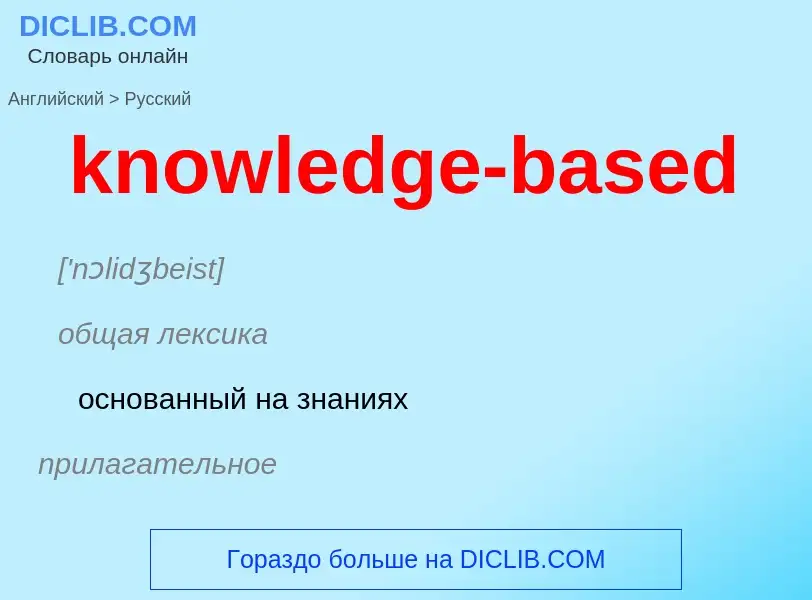Μετάφραση και ανάλυση λέξεων από την τεχνητή νοημοσύνη ChatGPT
Σε αυτήν τη σελίδα μπορείτε να λάβετε μια λεπτομερή ανάλυση μιας λέξης ή μιας φράσης, η οποία δημιουργήθηκε χρησιμοποιώντας το ChatGPT, την καλύτερη τεχνολογία τεχνητής νοημοσύνης μέχρι σήμερα:
- πώς χρησιμοποιείται η λέξη
- συχνότητα χρήσης
- χρησιμοποιείται πιο συχνά στον προφορικό ή γραπτό λόγο
- επιλογές μετάφρασης λέξεων
- παραδείγματα χρήσης (πολλές φράσεις με μετάφραση)
- ετυμολογία
knowledge-based - translation to ρωσικά
['nɔlidʒbeist]
общая лексика
основанный на знаниях
прилагательное
общая лексика
интеллектуальный
использующий средства или методы искусственного интеллекта
общая лексика
обнаружение [выявление] знаний
нахождение скрытых структур (patterns) в хранилищах данных, которые преобразуют данные в информацию
Смотрите также
Ορισμός
Βικιπαίδεια
The knowledge economy (or the knowledge-based economy) is an economic system in which the production of goods and services is based principally on knowledge-intensive activities that contribute to advancement in technical and scientific innovation. The key element of value is the greater dependence on human capital and intellectual property for the source of the innovative ideas, information and practices. Organisations are required to capitalise this "knowledge" into their production to stimulate and deepen the business development process. There is less reliance on physical input and natural resources. A knowledge-based economy relies on the crucial role of intangible assets within the organisations' settings in facilitating modern economic growth.
A knowledge economy features a highly skilled workforce within the microeconomic and macroeconomic environment; institutions and industries create jobs that demand specialized skills in order to meet the global market needs. Knowledge is viewed as an additional input to labour and capital. In principle, one's primary individual capital is knowledge together with the ability to perform so as to create economic value.
In a knowledge economy, highly skilled jobs require excellent technical skills and relational skills such as problem-solving, the flexibility to interface with multiple discipline areas as well as the ability to adapt to changes as opposed to moving or crafting physical objects in conventional manufacturing-based economies. A knowledge economy stands in contrast to an agrarian economy, in which the primary economic activity is subsistence farming for which the main requirement is manual labour or an industrialized economy that features mass production in which most of the workers are relatively unskilled.
A knowledge economy emphasizes the importance of skills in a service economy, the third phase of economic development, also called a post-industrial economy. It is related to an information economy, which emphasizes the importance of information as non-physical capital, and a digital economy, which emphasizes the degree to which information technology facilitates trade. For companies, intellectual property such as trade secrets, copyrighted material, and patented processes become more valuable in a knowledge economy than in earlier eras.
The global economy transition to a knowledge economy is also referred to as the Information Age, bringing about an information society. The term knowledge economy was made famous by Peter Drucker as the title of Chapter 12 in his book The Age of Discontinuity (1969), that Drucker attributed to economist Fritz Machlup, originating in the idea of scientific management developed by Frederick Winslow Taylor.

